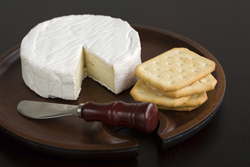Listeria in Pasteurized Soft Cheese Focus Groups
Focus Groups as Used by the Food and Drug Administration
0497_Listeria in PSC Appendix I PSC Focus Groups Messages
Listeria in Pasteurized Soft Cheese Focus Groups
OMB: 0910-0497
Listeria in Pasteurized Soft Cheese Messages for Focus Group Testing
A. Message with 2 alternative asterisk statements
“ Listeriosis” is a foodborne illness caused by a harmful bacterium called Listeria monocytogenes. Every year, 2,500 Americans become ill with Listeriosis-one of five cases result in death. Pregnant women and their unborn children have a higher risk of developing Listeriosis. About one-third of Listeriosis cases happen during pregnancy. There is a higher risk of developing Listeriosis with certain foods you eat. These include the following foods: certain ready to eat foods, refrigerated smoke fish, refrigerated luncheon meats, and soft cheeses** made from unpasteurized milk.
--------------------------------------------------------------
3. **Some soft cheeses made from pasteurized milk have been linked to outbreaks of Listeriosis due to processing problems in some cheese facilities. Vulnerable populations such as pregnant women, the elderly and immunocompromised consumers, should use caution when weighing the risks of consuming soft cheese.
4. **Soft cheese from raw milk presents the greatest risk of Listeriosis for vulnerable populations, such as pregnant women, the elderly and immunocompromised consumers. Soft cheese from pasteurized milk is generally regarded as safe. However, some soft cheeses made from pasteurized milk have been linked to outbreaks of Listeriosis due to processing problems in some cheese facilities. Vulnerable populations should use caution when weighing the risks of consuming soft cheese.
B. Message in table format 1 with an asterisk statement 3 above
Food |
What to do |
Soft cheeses like Feta, Brie, and Camembert, "blue-veined cheeses," "queso blanco," or "queso fresco" |
Do not eat unless they are made with pasteurized milk. ** |
Processed cheeses, processed cheese foods, and processed cheese spreads. |
Safe to eat |
Raw (unpasteurized) milk or foods that contain unpasteurized milk. |
Do not eat |
[Placeholder]**Some soft cheeses made from pasteurized milk have been linked to outbreaks of Listeriosis due to processing problems in some cheese facilities. Vulnerable populations such as pregnant women, the elderly and immunocompromised consumers, should use caution when weighing the risks of consuming soft cheese.
C. Message in table format 2 with an asterisk statement 3 above
Type of Food |
Higher Risk |
Lower Risk** |
Cheese |
-Brie
|
|
[Placeholder]**Some soft cheeses made from pasteurized milk have been linked to outbreaks of Listeriosis due to processing problems in some cheese facilities. Vulnerable populations such as pregnant women, the elderly and immunocompromised consumers, should use caution when weighing the risks of consuming soft cheese.
D. Message similar to formatting of FoodSafety.gov
Avoid Soft Cheese & Cheese Made from Unpasteurized Milk
When pregnant, a woman should avoid the following cheeses if made with unpasteurized milk:

Queso fresco
Queso blanco,
Brie,
Feta,
Camembert,
Blue-veined
Cheese made with unpasteurized milk may contain E. coli 017:H7, Salmonella or Listeria Monocytogenes. Even if made with pasteurized milk, the above listed cheeses may pose a risk of foodborne illness if they are produced in facilities with poor sanitation. Instead of eating soft cheese, eat hard cheese such as Cheddar or Swiss. If a pregnant woman wants to continue to eat soft cheese, she should make sure to check the label to ensure that the cheese is made from pasteurized milk. Pregnant woman should pay particular attention at farmers markets to make sure that fresh and soft cheeses are pasteurized.
| File Type | application/msword |
| Author | Waldrop, Christopher |
| Last Modified By | Verrill, Linda |
| File Modified | 2016-06-07 |
| File Created | 2016-06-07 |
© 2026 OMB.report | Privacy Policy